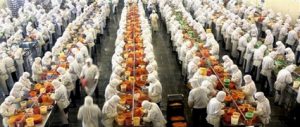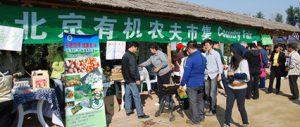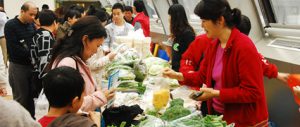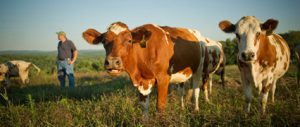Zhou Zejiang is Asia representative of the International Federation of Organic Agriculture Movements and consultant to the Ministry of Environmental Protection’s Organic Food Development Centre.
Zhou Wei: How well do you think food certification is run in China?
Zhou Zejiang: There are some problems with the industry itself. But I think that most of China’s organic foods are fine. If you count 100 as full marks and 60 as a pass, then most of China’s certified organic foods get 70. Some are doing well, and fully meet international standards. Of course, some aren’t so good and don’t pass, or are just fakes.
The Certification and Accreditation Administration’s new rules include a “one product, one code” system. That means there needs to be a 17-digit tracking number on the packaging of all organic products, and that has to link to full information – size and weight, source, the producer. If the consumer is interested, all that can be checked on the spot. And you know instantly if something hasn’t been certified. The labels are issued according to the quantities produced, so the makers can’t sneak in extra quantities. Nowhere else in the world has that degree of traceability for organic products.
ZW: Some years back, certain products being sold as organic were actually found to be regular foods. How reliable is certification today?
ZZ: The new methods for managing certification were a forced response – in the past, things were a bit of a mess. And now this is a sort of over-correction. But one clear benefit is flushing the fakes out of the market.
Of course, you can’t say that there aren’t any issues of trust around the certification system as a whole. There are still some tricky problems to solve. Certification depends on certifying bodies, and so there is the issue of checking the quality of certification itself. Also, the companies being certified may cheat – doing one thing while they are being certified, and another the rest of the time. So consumers can be sure what they’re buying has been certified, but that doesn’t mean it 100% meets organic standards. For that, you need to know how well it was certified and what supervision was like.
It’s commonly accepted nowadays for certification staff to get a gift from the company being certified. That’s not seen as a problem, particularly if the gift is the company’s own product. Taking money is definitely against the rules, but we can’t say it doesn’t happen.
As for how bad things are, the levels of honesty in organic certification are about the same as in other areas of certification – it all happens within the same cultural environment, so they’re unlikely to be much better. If corruption in industry or regulation isn’t solved, there’s no use having any number of certification bodies. You can’t just rely on tough [top-down] supervision, you need joint oversight by consumers and society.
ZW: How did organic food certification develop in China?
ZZ: The idea of “organic” food arrived in China in 1989. In 1990, overseas certification companies started working here. In 1994, the first Chinese certification body was formed, and certified its first product in 1995. The second was founded in 1999. Certification continued to expand until 2004, when it hit a peak, with over 30 certification bodies nationwide, certifying some 3.3 million hectares of farmland. Then the state intervened and that was cut down to 23 bodies, covering about 3 million hectares.
Between 1990 and 1998, certification was almost entirely for the export market. The domestic market only got going in 1999. But now, domestic sales of certified products far outstrip exports.
ZW: How did things change during that process?
ZZ: Originally, organic certification was overseen by the environmental authorities, which at the time meant the State Environmental Protection Agency [the body which later became the Ministry of Environmental Protection]. In 2003, it was handed over to the certification authorities.
After a period of rapid growth in 2003 and 2004, national standards for organic food were put in place in 2005 and the state started to clean up the sector, reducing the number of certifying bodies and the area of land covered.
Organic food certification wasn’t originally about food safety – it was about developing ecological agriculture and protecting the environment. But once food safety emerged as an area of concern, “organic” came to be seen as some sort of saviour. I don’t think it’s right for organic agriculture to be the focus of the food safety agenda.
The facts show that too much emphasis on the importance of organic certification for food safety can mislead the consumers and have a negative effect. It can also warp the development of certification and cause rogue merchants to produce fake organic products.
ZW: What problems do you see with the way the government manages organic certification?
ZZ: Organic food accounts for much less than even 1% of the Chinese market. Compared with other foods, it is actually over-regulated.
You aren’t allowed to use any pesticide or chemical fertiliser when growing organic food. That’s a very high standard, but you can do tests for that, which means it’s actually very easy to regulate. And as organic food is pricier than other products, consumers are more concerned – so organic food has actually become the focus of regulation. The certification administration has spent a lot of time on organic certification, and the traceability system for organic food we’re running now is the most advanced in the world.
So they’re regulating whatever is easy to regulate, and things are out of proportion. Genuine organic food needs to be provided by firms in response to market demand – the government should be neither pushing for unrealistic growth, nor controlling its development through excessive regulation.
While continuing to oversee production of organic and green foods, regulatory efforts should focus more on normal foods. All foods should be safe, that’s key. Organic foods should be an added extra, once safety of all food is assured. They shouldn’t be the solution to the unsafe foods.
ZW: What would you like to see happen next?
ZZ: The government needs to take a range of measures and do a number of things if organic foods are to be a success. It needs to manage regulation, implementation and food-producers. It needs to promote knowledge of organic foods, allowing consumers to participate in the development and oversight of the organic food industry.
And besides certification, I’d like to see a system for building trust between responsible consumers and honest producers, encouraging local sourcing and consumption, reducing food miles, protecting the environment and saving resources. If that was done all over the country, you would have a large and nationwide system for safe food production and consumption.





